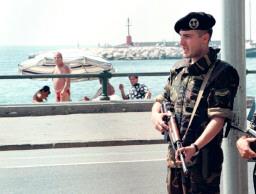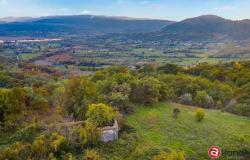The government on Tuesday launched a scheme that will deploy 3,000 troops in major Italian cities to help police the streets.
Interior Minister Roberto Maroni and Defence Minister Ignazio La Russa unveiled the six-month pilot scheme, which will start on Monday.
They said the army, air force, navy and Carabinieri would work alongside police.
Two thousand troops will be placed at the disposal of 16 mayors to guard black spots and immigration holding centres in cities ranging from Agrigento, Caltanissetta, Siracusa and Trapani in Sicily to Catanzarao and Crotone in Calabria, Bari, Brindisi and Foggia in Puglia, Modena and Bologna in Emilia-Romagna, Cagliari in Sardinia and Turin in Piedmont - as well as Rome, Milan and Naples.
Some units will watch 'sensitive' sites in Rome, Milan and Naples - 51 in the capital, 20 in Milan and one in Naples.
This would free up police for regular crime fighting, Maroni said.
The remaining 1,000 will patrol the streets of Bari, Catania, Milan, Naples, Padua, Palermo, Padua, Rome, Turin and Verona.
Rome will have the most soldiers on the streets, 195, followed by Milan with 170 and Naples with 150.
Troop patrol numbers will be 90 in Bari, 80 in Turin, 50 in Palermo, 45 in Padua and 45 in Verona. Patrol troops will be dressed in fatigues and will carry
only small arms while those guarding sensitive sites will have body armour and machine guns, Maroni said.
City prefects will set rules of engagement at regular meetings on public order.
''It's a useful initiative,'' Maroni said.
''After six months we will make an evaluation to see whether it has worked and should be extended to other cities,'' he said.
''This is not a militarisation of cities but a clear response to the perceived demand for greater security,'' La Russa said.
General Giovanni Ridino', army commander for ground operations, said Italian troops had picked up valuable experience in policing dangerous streets while on missions abroad.
''A soldier who has been in Afghanistan or Lebanon won't have any problems,'' he said.
''Troops on foreign missions already carry out patrols. With a few adjustments they will be able to face any situation,'' he said.
The centre-left opposition continued to depict the deployment as a stunt to meet an alleged crime and immigration emergency which was not borne out by statistics.
They predicted it would backfire by scaring tourists off while doing little to deter criminals.
Marco Minniti, the shadow interior minister of the Democratic Party, said: ''It's an image-boosting operation that risks turning into a boomerang''.
''It will make Italy look like a country in the grip of an uncontrolled security emergency''.
''Paratroopers guarding the centres of the major tourist cities aren't exactly a great calling card for a country at the height of the tourist season''.
Antonio Di Pietro of the Italy of Values party said that, in statistical terms, ''we'll have one soldier for every 10 municipalities, doing nothing except going to the bar with a policeman. It's a joke. And to cap it all it's only a provisional measure''.
The last time Italy put soldiers on the streets was to fight a crime wave in Naples in 1997.
Troops were also deployed in Sicily after a Mafia bomb campaign in 1993-4.










